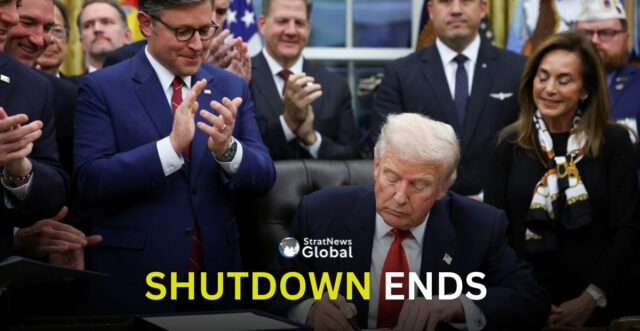U.S. President Donald Trump on Wednesday signed a bill to end the longest government shutdown in U.S. history, hours after the House of Representatives approved measures to restore food assistance, pay federal employees and restart the nation’s air-traffic control system.
The House, controlled by Republicans, passed the package by a vote of 222–209. Trump’s backing helped keep his party unified despite strong opposition from Democrats, who remain angered that a prolonged standoff initiated by their Senate colleagues failed to secure an extension of federal health insurance subsidies.
The bill, which cleared the Senate earlier in the week, will allow hundreds of thousands of federal workers idled by the 43-day shutdown to begin returning to their jobs as early as Thursday. It remains unclear how quickly full government operations will resume.
The agreement funds the government through January 30, keeping federal spending on a trajectory that adds about $1.8 trillion annually to the national debt, which stands at roughly $38 trillion.
The end of the shutdown is expected to aid recovery in air travel ahead of Thanksgiving and restore food assistance for millions during the holiday shopping season. It will also revive the release of key U.S. economic data, giving investors and policymakers clearer readings on employment, inflation and growth.
The White House, however, said that employment and Consumer Price Index reports for October may never be published, leaving some gaps in the economic record.
Economists estimate that the shutdown reduced gross domestic product by more than a tenth of a percentage point for each of its six weeks. Most of that lost output is expected to be recovered in the coming months.
The vote came eight days after Democrats won several high-profile elections that they believed strengthened their case for extending health insurance subsidies, which expire at the end of the year. While the deal allows for a December Senate vote on the issue, House Speaker Mike Johnson has offered no commitment on bringing the matter to a vote in the House.
(With inputs from Reuters)





